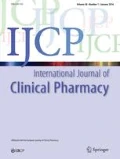Abstract
Background Polypharmacy is prevalent in older adults and has been associated with iatrogenic harm. Deprescribing has been promoted to reduce polypharmacy. It remains however unclear whether deprescribing during hospital stay can reduce the readmission risk. Objective We sought to determine whether deprescribing in geriatric inpatients was associated with a lower readmission risk at three months post-discharge. Method A case control study was performed, using data from a prospective, controlled study in geriatric inpatients. Deprescribing was defined as the percentage of discontinued preadmission medications and was assessed upon discharge. A logistic regression analysis was used to determine the odds ratio for deprescribing and the outcome of readmissions. An adjusted odds ratio was then estimated, taking into account age, sex, mortality, the number of preadmission medications and the Charlson Comorbidity Index. Results Data of 166 patients were analysed, of whom 61 had experienced at least one readmission. Adjusting for age, number of preadmission medications and mortality resulted in the most informative regression model, based on the lowest Akaike information criterion (adjusted odds ratio 0.981, 95% confidence interval 0.964 to 0.998). Conclusion Deprescribing in geriatric inpatients was associated with a reduced readmission risk at three months post-discharge.
Trial registration S53664.
Data availability
The datasets generated during the original study and analysed during the current study are available from the corresponding author on reasonable request.
References
Scott IA, Hilmer SN, Reeve E, Potter K, Le Couteur D, Rigby D, et al. Reducing inappropriate polypharmacy: the process of deprescribing. JAMA Intern Med. 2015;175(5):827–34.
Gillespie U, Alassaad A, Henrohn D, Garmo H, Hammarlund-Udenaes M, Toss H, et al. A comprehensive pharmacist intervention to reduce morbidity in patients 80 years or older: a randomized controlled trial. Arch Intern Med. 2009;169(9):894–900.
Ravn-Nielsen LV, Duckert ML, Lund ML, Henriksen JP, Nielsen ML, Eriksen CS, et al. Effect of an in-hospital multifaceted clinical pharmacist intervention on the risk of readmission: a randomized clinical trial. JAMA Intern Med. 2018;178(3):375–82.
Cooper JA, Cadogan CA, Patterson SM, Kerse N, Bradley MC, Ryan C, et al. Interventions to improve the appropriate use of polypharmacy in older people: a Cochrane systematic review. BMJ Open. 2015;5(12):e009235.
Christensen M, Lundh A. Medication review in hospitalised patients to reduce morbidity and mortality. Cochrane Database Syst Rev. 2016;2:CD008986.
Van der Linden L, Decoutere L, Walgraeve K, Milisen K, Flamaing J, Spriet I, et al. Combined Use of the rationalization of home medication by an adjusted STOPP in older patients (RASP) list and a pharmacist-led medication review in very old inpatients: impact on quality of prescribing and clinical outcome. Drugs Aging. 2017;34(2):123–33.
Charlson ME, Pompei P, Ales KL, MacKenzie CR. A new method of classifying prognostic comorbidity in longitudinal studies: development and validation. J Chronic Dis. 1987;40(5):373–83.
Russell P, Laubscher S, Roberts GW, Mangoni AA, McDonald C, Hendrix I, et al. A pilot cohort study of deprescribing for nursing home patients acutely admitted to hospital. Ther Adv Drug Saf. 2019;10:2042098619854876.
Edey R, Edwards N, Von Sychowski J, Bains A, Spence J, Martinusen D. Impact of deprescribing rounds on discharge prescriptions: an interventional trial. Int J Clin Pharm. 2019;41(1):159–66.
Garfinkel D, Mangin D. Feasibility study of a systematic approach for discontinuation of multiple medications in older adults: addressing polypharmacy. Arch Intern Med. 2010;170(18):1648–54.
Benbassat J, Taragin M. Hospital readmissions as a measure of quality of health care: advantages and limitations. Arch Intern Med. 2000;160(8):1074–81.
Funding
No specific funding was received to perform this study.
Author information
Authors and Affiliations
Corresponding author
Ethics declarations
Conflicts of interest
The authors declare that they have no conflict of interest.
Additional information
Publisher's Note
Springer Nature remains neutral with regard to jurisdictional claims in published maps and institutional affiliations.
Rights and permissions
About this article
Cite this article
Hellemans, L., Hias, J., Walgraeve, K. et al. Deprescribing in geriatric inpatients is associated with a lower readmission risk: a case control study. Int J Clin Pharm 42, 1374–1378 (2020). https://doi.org/10.1007/s11096-020-01091-4
Received:
Accepted:
Published:
Issue Date:
DOI: https://doi.org/10.1007/s11096-020-01091-4

